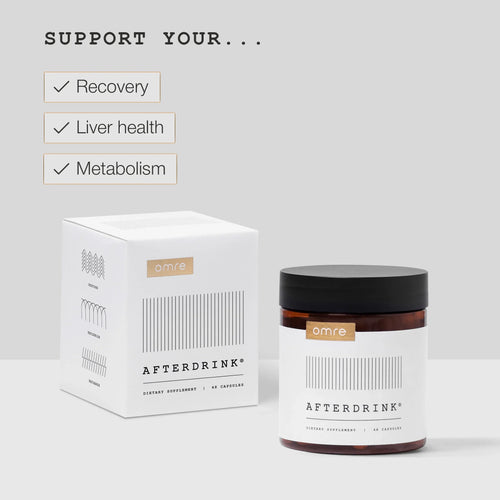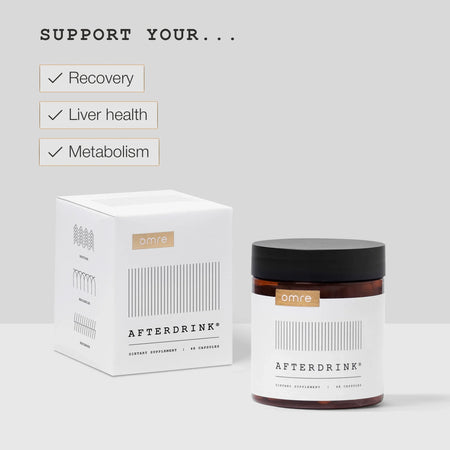Table of Contents
Does Sake give you a hangover and is there a cure for it? It’s actually a surprisingly common question and one that doesn’t exactly have a straightforward answer.
If you’re on this article, chances are, you’re looking for an alcoholic beverage that’ll give you less of a hangover. Perhaps you’ve even heard that Sake doesn’t give you a hangover at all.
In this article, we’re going to take a detailed look at whether sake gives you a bad hangover or not. And most importantly, whether there is anything you can to get rid of a sake hangover if you end up having one.
Sake is a Japanese drink that is popular in restaurants and bars all over the world. With its popularity comes many myths which we aim to shine some light on.
So, with the introductions out the way, let’s take look into everything you need to know about sake and hangovers.
AFTERDRINK®
A supercharged antioxidant designed to support recovery, made from the very best, research-backed ingredients on the market.*
What is Sake?
Sake, also spelled saké is an alcoholic beverage made by fermenting rice that has been polished to remove the bran. It’s also known as Japanese rice wine.
Despite the name, unlike wine, which is produced by fermenting sugar grapes, Sake is produced by a brewing process that is similar to how beer is made. The starch is converted into sugars, which ferment into alcohol.
The alcohol content in sake is higher than in wine and beer. while most beer contains 3–9% alcohol and wine around 14%, sake contains 15–20% alcohol.
In Japanese, the word “sake” can refer to any alcoholic drink. However, the drink we typically refer to as “Sake” is more well known as Nihonshu, meaning ‘Japanese liquor’.
How do you drink Sake?
Sake is traditionally drunk from small cups called choko or o-choko and poured into it from ceramic flasks called tokkuri. Traditionally one does not pour one’s own drink, which is known as tejaku, but instead, members of a party pour drinks for each other.
It’s drunk cold, at room temperature, or warmed depending on the type of sake and time of year. Sake is often enjoyed during appetizers, or izakaya (tapas) style dining.
Some of the points mentioned above are relevant when it comes to Sake and hangovers. More on this next. And now that we’ve got the basics out the way, we can take a closer look at whether Sake gives you a hangover.
Does Sake give you a hangover?
So, now it’s time to take a look at the all-important question of whether Sake gives you a hangover or not.
Technically speaking, all alcohol regardless of type has the potential to give you a hangover. Therefore, sake can definitely give you a hangover if you drink enough of it. It's a myth if you hear someone say "Sake doesn't give hangovers".
That said, sake may cause less of a hangover than other drinks. This is because it has low to moderate alcohol content and it’s generally a light-colored alcoholic beverage.
Lighter-colored drinks contain fewer congeners. Congeners are the name given to the by-products produced during the fermentation and aging process of alcohol. They are naturally occurring and are responsible for the taste and aroma of alcoholic drinks.
However, studies have shown that drinks that have a higher concentration of congeners give worse hangovers.(1)
It’s why red wine and whiskey hangovers are notoriously bad.
Depending on the age of sake, it’ll usually be clear to light yellow in color which means it has a low congener concentration.
Furthermore, sake is traditionally drunk with a meal. This is important because food slows down the speed at which alcohol is absorbed into your bloodstream. This is important when it comes to hangovers because drinking on an empty stomach causes spikes in blood alcohol concentration. In the presence of food, alcohol is absorbed at a steady rate which gives your liver a chance to metabolize alcohol and its by-products.
Sake, like all other types of alcohol, will give you hangover if you drink enough of it. Unfortunately, it's not true that sake doesn't give you a hangover.
Causes of a hangover
Before we get into remedies for a hangover, it's important to go over how alcohol causes damage in the first place.
The science of hangovers is complicated and there's no single cause. Scientists agree that the following factors are involved:
- Dehydration: Alcohol is a diuretic and makes your kidneys flush out water.
- Inflammation: Congeners and by-products of alcohol metabolism such as acetaldehyde react with your cells which fuels cellular inflammation.
- Reduced sleep quality: Alcohol blocks your brain from reaching the REM stage of sleep. This is crucial for waking up fully rested.
- Hormonal imbalances: Alcohol disrupts the normal functioning of hormonal pathways including insulin and cortisol regulation.
AFTERDRINK®
A supercharged antioxidant designed to support recovery, made from the very best, research-backed ingredients on the market.*
Sake hangover cure
So, you’ve woken up with a Sake hangover and are looking for a cure, what do you do?
You should treat a sake hangover like any other hangover. At the end of the day, alcohol is alcohol. It doesn’t make much difference what the source drink is.
At this stage, it’s important for us to mention that a magic sake hangover cure doesn’t exist. That said, there are certain things you can do to dampen the blow:
1. Proper hydration
Most people try to rehydrate in the morning after they've woken up with a hangover. However, making sure you are properly hydrated before your hangover sets in is a better approach.
Having a glass of water between the rounds of Sake is a good way of keeping hydrated. You could also consider investing in rehydration mixes that contain a specific ratio of electrolytes and sugars which support rapid hydration. Either way, making sure you are well topped up before you hit the sack is key.
2. Painkillers
Painkillers like Advil and ibuprofen will help reduce the headache and muscle aches associated with a hangover.
Drugs like Advil and ibuprofen come with an extensive list of side effects which you should familiarise yourself with.
3. Back to sleep
The best sake hangover cure is to try and get some more rest and sleep. If you’ve got the luxury of time, taking yourself back to bed will give your body the much-needed downtime it needs to recover.
Things to avoid
There are certain things you’ll want to avoid if you’ve got a sake hangover. and you’ll be surprised how common it is that people do these things routinely:
1. Caffeine
Reaching for a cup of coffee is the go-to drink for most people when hungover. But you may want to think twice the next time you reach for a mug of black gold.
Although caffeine will certainly make you feel more awake and alert, the extra stimulation can make you feel more on edge and jittery. Furthermore, caffeine is a diuretic like alcohol which means it can exacerbate dehydration.
2. Exercise
“Sweating out a hangover” is a common myth that many people still believe in. There are no mysterious “toxins” to sweat out when hungover. Doing any exercise when hungover only puts added pressure on your body at a time when it needs to recover. Take it easy, Netflix and chill.
3. Hard to digest food
After a big night out you may want to switch to healthier food to balance everything out. However, salads and vegetables are hard foods for your stomach to digest. The same goes for red meat.
If you’re feeling nauseous, you may want to consider avoiding these foods to allow some more time for your gastrointestinal tract to recover. Simple carbohydrates like pasta, rice, and potatoes may sit better in your stomach.
Sake hangover – Final words
That brings us to the end of our look into Sake hangovers.
We’ve walked you through the possible reasons why Sake is perceived by many to give less of a hangover. This is mainly because sake is a lighter-colored drink and, therefore, contains a lower concentration of congeners.
Furthermore, sake is traditionally drunk alongside a meal which greatly reduces how fast alcohol is absorbed.
Ultimately, if you drink enough sake, you’re guaranteed to wake up with a hangover. And if you’ve heard that sake doesn’t give you a hangover, it’s simply not true.
If you’re interested in finding out which type of alcohol gives the worst hangovers, check out our article on wine hangovers.





